MORE COVERAGE
Twitter Coverage
Satyaagrah
Written on
Satyaagrah
Written on
Satyaagrah
Written on
Satyaagrah
Written on
Satyaagrah
Written on
JOIN SATYAAGRAH SOCIAL MEDIA
"Fake news: the wolf in the media's clothing": Refuting claims of Saket Gokhale and others of 300% budget overshoot on G20 Summit, Govt asserted that the 'expenses directed towards permanent asset creation', shedding light on infrastructural developments

Amidst a climate where misinformation can circulate rapidly, it is incumbent upon responsible journalism to shed light on the truth. Recently, a flurry of accusations erupted on social media platforms concerning the fiscal management of the G20 summit held in Delhi, spearheaded by a series of high-profile figures, including politicians like TMC MP Saket Gokhale. They alleged, rather vociferously, that the government had overshot its budget for the event by an exorbitant 300%, a claim that sent ripples of dismay across various sectors of society.
|
However, on the clear morning of Monday, September 11, a beacon of truth emerged to clear the fog of misinformation. The Press Information Bureau (PIB), a reliable bastion of factual information, took to their official social media platform, previously known as Twitter, to debunk these incendiary claims. Displaying a steadfast commitment to transparency and accuracy, they emphatically stated that the claims circulating were not only misleading but entirely devoid of substance.
Despite the relentless assault from several corners tagging themselves as liberals and leftists, the central government stood firm, holding the helm steady amid the chaos. These individuals seemed bent on painting a picture of fiscal irresponsibility, stating that an exorbitant amount of Rs 4,100 crore was splurged on a two-day event, a figure allegedly dwarfing the initially allocated Rs 990 crore.
It appears, however, that these statements were a blend of misinformation and perhaps a gross misunderstanding of the nuances involved in budget allocation and expenditure. The government, in its rebuttal, not only dismissed these claims but offered a clear, straightforward explanation, asserting that the expenses were oriented towards "permanent asset creation", a facet often overlooked but vital for long-term growth and development.
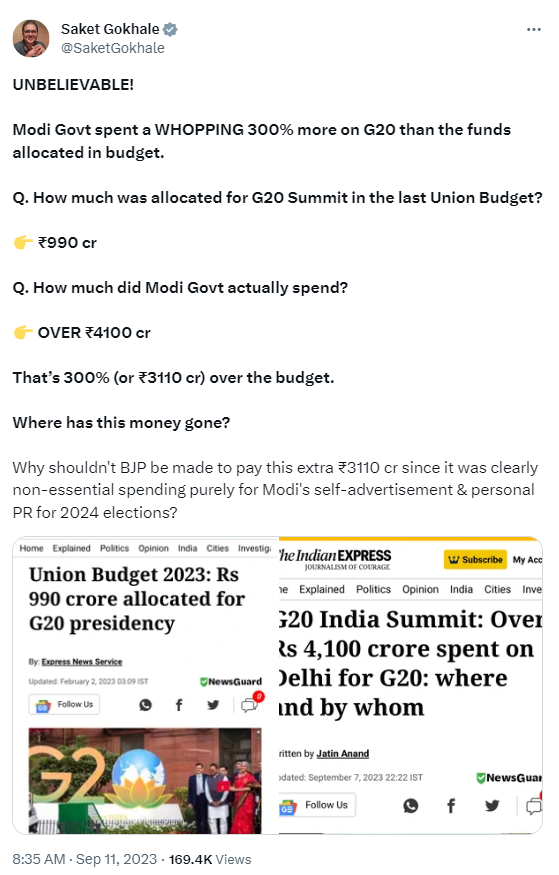 |
| Screenshot from Twitter |
In a democracy, it is the duty and the right of the opposition to scrutinize government expenditures and policies. However, it is equally important that this scrutiny is based on solid ground and not fostered by misinformation or hyperbole.
Recently, accusations were thrown at the ruling BJP government regarding their spending on the G20 Summit, with figures suggesting a perceived excess of Rs 3110 crore. TMC MP Saket Gokhale even went as far as to claim that this was a lavish spend for the Prime Minister's 'self-advertisement' and a PR stunt aimed at the 2024 elections.
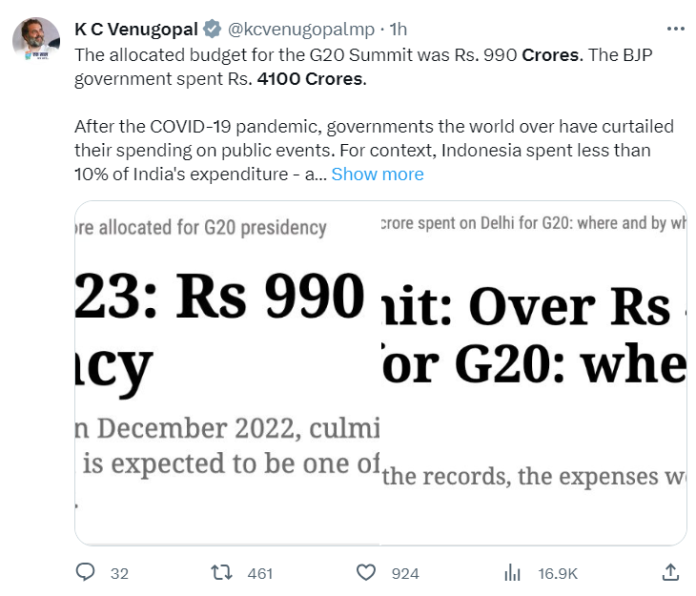 |
| Screenshot from Twitter |
These claims were echoed by Congress MP KC Venugopal, who took a rather sweeping stance, criticizing the government for alleged financial mismanagement, not just in the context of the G20 summit but also hinting at wider economic issues. His claims painted a picture of a government allegedly neglectful of its responsibilities towards farmers and flood-affected regions, instead focusing on 'beautification drives'.
However, it is crucial for the public to remain discerning and take into account the government's point of view and the broader context. It is essential to understand that international summits like the G20 are not mere 'day events' but significant platforms where vital dialogues and collaborations take place, fostering relationships that can potentially bring substantial benefits to the nation.
|
Moreover, the government has been quick to clarify that the expenditures were not frivolous but were channeled towards creating permanent assets, a move that indicates foresight and a dedication to long-term development rather than short-term image-building exercises.
Furthermore, it is a bit precipitated to label the initiatives as merely 'beautification drives'. Investments in infrastructure and amenities are integral for a nation's growth, and portraying them as a 'drain of public money' overlooks the broader perspective of national development.
In these times, where misinformation can rapidly overshadow facts, it is incumbent upon the public to scrutinize claims carefully, analyze diverse perspectives and understand the intricacies involved before forming judgments. It's a call for a more informed and nuanced approach to political discourse, where facts triumph over sensationalism.
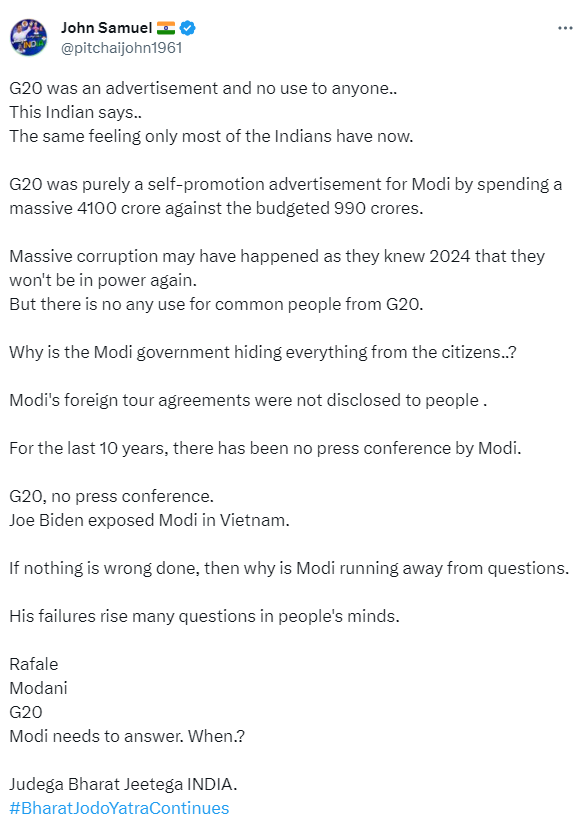 |
| Screenshot from Twitter |
It is not uncommon to see criticisms surfacing on social platforms, often influenced by partisan perspectives. A certain Congress supporter on Twitter suggested that the G20 summit was more of an 'advertisement' venture by the BJP government, ostensibly aiming to shore up support for the upcoming 2024 elections. While it is essential to hold governments accountable, dismissing an international summit of the G20's stature as mere 'advertisement' or 'of no use to anyone' seems to undermine the substantial diplomatic and economic discussions that usually characterize such events.
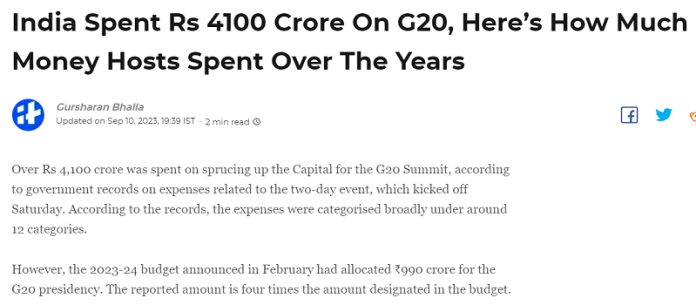 |
| Report by India Times |
Apart from the liberals and opposition leaders, several media houses like Business Today, India Times, Deccan Herald, WION news, etc. also furthered similar information. A report by India Times said that the amount spent by the government for the G20 event in Delhi is four times the amount designated in the budget.
Furthermore, various media outlets have amplified these claims, suggesting a substantial discrepancy between the allocated budget and the actual expenditure for the summit. Comparisons have been made with other nations like Indonesia, Japan, Argentina, and China, implying that India's spending was disproportionately high.
However, it is crucial to note that hosting an event of such magnitude is a complex task, involving multiple variables that dictate the overall expenditure. While it is valid to aspire for fiscal responsibility, it is also necessary to ensure that the country hosts a successful and productive summit. Different countries have different priorities, infrastructure and capabilities which can result in varied costs when hosting international events.
Moreover, the government has strongly countered these allegations, emphasizing that the expenditures were directed towards creating permanent assets, which is a significant aspect of nation-building and infrastructure development. The Press Information Bureau (PIB) clarified that the claims being circulated about the budget overshoot were misleading, urging the public to steer clear from such misinformation.
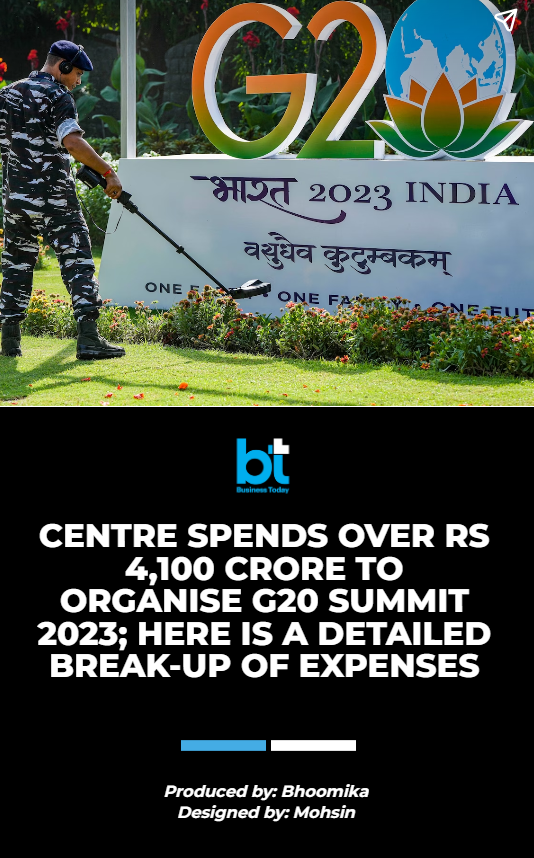 |
| Report by Business Today |
Expense toward permanent asset creation: PIB fact checks misleading claims on G20 Summit
Addressing the widespread conjecture surrounding the G20 Summit expenses, the Press Information Bureau (PIB) has actively intervened to rectify the misleading narratives disseminated by certain media outlets and political leaders. In a recent statement, the PIB debunked the exaggerated claims on the government's expenditure during the summit. The allegations primarily stemmed from a tweet by TMC MP Saket Gokhale, which suggested an overshoot of 300% of the initially allocated funds.
The PIB fact check emphatically clarified that these claims are grossly misleading. A significant portion of the expenditure was channeled towards permanent asset creation facilitated by the India Trade Promotion Organisation (ITPO) and other infrastructure developments. Moreover, it is pivotal to note that these developments are not confined to the G20 Summit alone but form a part of a larger initiative aimed at bolstering the nation's infrastructure.
The G20, or Group of Twenty, established in 1999, serves as a significant platform where 20 nations, inclusive of the EU, come together to deliberate on global economic and financial issues. This group facilitates vital discussions that can pave the way for international cooperation and economic stability. In 2023, India proudly holds the presidency, a role that rotates among member nations. Hosting an event of this stature not only showcases India's emerging status on the global stage but also potentially harbours long-term benefits, possibly stretching across several decades.
It is thus essential to recognize the far-reaching and multi-faceted impact that hosting such a prestigious event can have on India. From fostering international relations to facilitating economic collaborations, the repercussions are manifold and can significantly contribute to India's growth and stature in the international arena. Therefore, it is critical that discussions surrounding such events are grounded in facts and not swayed by misleading narratives that fail to consider the broader perspective and the long-term gains associated with hosting the G20 Summit.
 Support Us
Support Us
Satyagraha was born from the heart of our land, with an undying aim to unveil the true essence of Bharat. It seeks to illuminate the hidden tales of our valiant freedom fighters and the rich chronicles that haven't yet sung their complete melody in the mainstream.
While platforms like NDTV and 'The Wire' effortlessly garner funds under the banner of safeguarding democracy, we at Satyagraha walk a different path. Our strength and resonance come from you. In this journey to weave a stronger Bharat, every little contribution amplifies our voice. Let's come together, contribute as you can, and champion the true spirit of our nation.
 |  |  |
| ICICI Bank of Satyaagrah | Razorpay Bank of Satyaagrah | PayPal Bank of Satyaagrah - For International Payments |
If all above doesn't work, then try the LINK below:
Please share the article on other platforms
DISCLAIMER: The author is solely responsible for the views expressed in this article. The author carries the responsibility for citing and/or licensing of images utilized within the text. The website also frequently uses non-commercial images for representational purposes only in line with the article. We are not responsible for the authenticity of such images. If some images have a copyright issue, we request the person/entity to contact us at This email address is being protected from spambots. You need JavaScript enabled to view it. and we will take the necessary actions to resolve the issue.
Related Articles
- "Fact-Fiction's Frontier": American journalist Amy Mek warns of AltNews' Mohammed Zubair's attempts to tarnish her and other conservatives for revealing Hamas propaganda, accuse him of peddling disinformation, and potential ties to anti-India funders
- After being slammed by Indians for fake news, Rana Ayyub is now being blasted by Saudis for supporting terrorists in her tweet "Yemen is bleeding and there is nobody to stop the bloodthirsty Saudis”
- From Shabana Azmi's ‘daaru delivery dude’ and Aurangabad teen’s NASA claims to Nidhi’s Harvard job: Most talked about frauds of 2021
- "Narrative Navigators": In the Israel-Hamas conflict, the BBC, after spreading misinformation on a Gaza hospital event, releases a guide on discerning disinformation, the network later conceded a correspondent's mistake in blaming an Israeli airstrike
- "Twisted tales in mainstream headlines": In a fervent Lok Sabha session, Kiren Rijiju swiftly counters MP Kakoli Ghosh Dastidar's false allegations about unpaid ISRO and IIT scientists, spotlighting ongoing misinformation since the Chandrayaan-3 launch
- Propagandists spread hue and cry after PM's new Mercedes Maybach which is a routine replacement, but hushed on Sonia Gandhi using Range Rovers procured for the then PM
- "Pimp stands for Positive Intellectual Motivated Person. It has nothing to do with selling sex for money": ‘Misinformation seems to be the hallmark of Global Hunger Report. Index is an erroneous measure of hunger and suffers methodological issues’: India
- Tehelka News | In a ground-breaking verdict, the Delhi High Court slapped Tehelka, Tarun Tejpal, Aniruddha Bahal, Mathew Samuel with an order to pay ₹2 crore to Major General MS Ahluwalia following a 2001 sting operation that defamed the ex-Army officer
- New York Times receives a befitting reply from India over its report alleging India is stalling WHO’s efforts to make global Covid death toll public: Also asked NYT why it was unable to learn the estimates of other countries
- Billionaire Sunjay Kapur’s sudden death during a London polo match sparks a ₹30,000 crore storm—Rani Kapur alleges foul play, Priya Sachdev seizes control, and a fractured family wages war over Sona Comstar’s vast and fiercely contested empire
- "Fraud and falsehood only dread examination. Truth invites it": DMK Minister Senthil Balaji rolls around & cries uncontrollably of chest pain when taken into custody on corruption charges by ED, he is 2nd most powerful man & money bank of the ruling party
- Sehaj Arora, Kulhad Pizza owner, confronts a damaging video, pleading with the public over the trauma inflicted on his family, as accusation of AI morphing arise, Jalandhar police pinpoint a revenge-driven ex-employee, Soniya, behind the alleged blackmail
- "Evidence Against Teesta Setalvad": She is arrested for false testimony in Gujarat riots and how Congress, Teesta Setalvad, Sanjiv Bhatt and Times of India colluded against Narendra Modi, and US Government regular interaction with the cabal
- Crowdfunding platforms used by Kanhaiya Kumar, Dr Kafeel Khan and Saket Gokhale disappeared mysteriously after collecting funds from public
- Christian teacher asked the students to recite Christian prayers while she abused Hindu deities, ‘Bhagwat Gita is evil, read Bible’: Tailoring teacher in Tamil Nadu forces students to follow Christianity, suspended


























